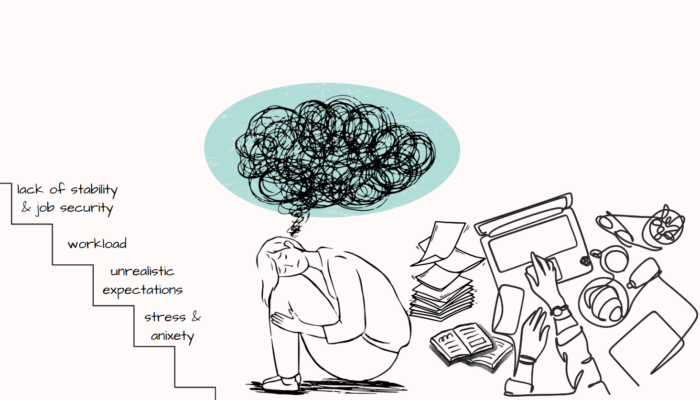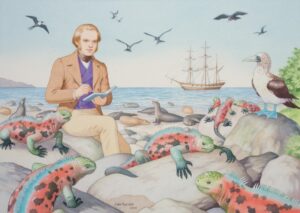
We’re excited to bring back “Postdoc Diaries,” a series where we engage with postdocs, discuss and learn about their challenges. In our last post, we delved into some of the most prevalent struggles they encounter. This time, we had a conversation with Yi-Wei Chen, a postdoc at the Technical University of Munich, to gain insight into the experience of being a postdoc. If you are interested in sharing your experience and struggles as a postdoc, contact us at ecs-g@egu.eu (anonymous is fine too). Now let’s leave the space to Yi-Wei!
Have you ever rushed into a conference room, then, after a few minutes, you still had no idea what the speaker was talking about, and you finally realized you were in the wrong room? Well, this is precisely what I felt at the beginning of my postdoc.
Hello, readers! I am Yi-Wei Chen, a postdoc at the Technical University of Munich (TUM), Germany. Today, I am thrilled (and, at the same time, feeling vulnerable) to share with you some details about my struggles as a postdoc. My postdoc position is under the Uplift project, a DFG-funded joint project between LMU and TUM. The project aims to understand Earth’s uplift process across various disciplines, including geodetics, geology, seismology, landscape evolution, geodynamics, mathematics, and computer science. Although each field has its corresponding small research group, we all meet frequently to understand each other’s work and, most importantly, to link different topics, weaving them into our broader project.
Stepping out of my comfort zone
In a project with such a vast diversity of topics, I’ve always felt like I was sitting in the wrong conference room, knowing nothing and feeling frustrated. When it was my turn to present, frustration passed to the others. Ironic, isn’t it? 🙂 . I still remember the confusion in the eyes of the attendees in our first transdisciplinary seminar. From my past experiences, I learnt that a good presentation always provides something exciting and new, but first, I need to understand what the presentation is all about. I realised that the underlying problem in my first presentation was that what I had considered as ‘old’ and ‘boring’ was, in fact, new for my audience. And I was so tempted to rush to the ‘new’ and ‘exciting’ part of my research that my audience felt lost on the way. A presentation that works perfectly in my little academic bubble does not work for such a diverse audience. In addition to the content, I also used too much jargon from my field. To help others understand my work, I needed to first understand their fields and use their languages.
Stepping out of my comfort zone was not easy. Although I have excellent communication with all the experts around me, the difference in our education and training backgrounds makes it difficult to even phrase my questions meaningfully. As a trained geologist, catching up with the fields that require math and coding skills was a steep learning curve. Looking for the way out, I found out what works best for me, surprisingly, was to first search for the problem on YouTube. Due to the pandemic, many seminars and courses were streamed and uploaded on YouTube. These YouTube videos are easier to understand and perceive because the authors explained their works as if they were explaining them to me face-to-face. I realised that being equipped with some prior knowledge and understanding on the mutual topics, communication with peers becomes more efficient and effective. I would also recommend befriending your colleagues in your group. I definitely felt less embarrassed when asking ‘stupid questions’ and being honest by saying ‘’I don’t understand, please repeat again’’ even if it’s the third time I have asked when I am surrounded by my friends.
The gap between expectation and reality …. fills with endless anxiety.
Papers, papers, and papers. If you asked a senior scientist what the most crucial thing a postdoc should do is, publications would always be the answer. This is crucial because a postdoc is generally considered a transitional phase of academic life, and to receive a secured, permanent position, the quality and the quantity of publications would be the key. However, in my first year as a postdoc, I was busy learning new things, and my research made limited progress. Inside my head, a voice that reminded me of what I was supposed to do haunted me day and night.
Although it is exciting, learning new things makes me feel vulnerable. Before starting my postdoc, I expected myself to be professional and to be able to provide many with practical help. However, in reality, I had been asking for help from other PhD students. I remember hearing other postdocs complaining about spending too much time guiding new master’s or PhD students, but believe it or not, not being capable of supporting them feels even worse. The gap between expectation and reality made me feel like a failure. Let me clarify here: everyone is friendly and helpful, and no one has been pushing me in any way; they instead encouraged me quite often. It is because the failure to reach my own expectations made me feel anxious and lose confidence. Drinking beer and talking to friends for help might’ve worked for me temporarily; I knew I must overcome it to receive internal peace.
Weaving my expertise into the project
When I began my postdoc, I thought the way to succeed in such a complicated, transdisciplinary project was to understand the details of each field so that I could better synthesize the results from different sub-projects. However, this mindset has put me in a position where I always had to catch up. I worked hard, and yet my work proved to be unfruitful. More importantly, I ignored and wasted my expertise. After speaking with the lead PIs, we came up with a new sub-project that I could bring in my skills. Surprisingly, having my own project actually facilitates my original task of synthesizing different sub-projects. I started asking myself how my results could manifest in other projects. This helps me ask meaningful and precise questions. Instead of being passive, waiting for others to discuss their results with me, I can now take an active role, reaching out to them and asking if my predictions show up. This new mindset makes the whole process much more exciting and fruitful. Of course, in most cases, my predictions are barely correct, but this interactive process helps me understand the limitations and uncertainties of each different approach at a new level.
At the beginning of this transdisciplinary project, many expressed concerns about learning from each other while being busy and fostering their own expertise at the same time, being difficult. However, my experience shows that it is most effective when the two processes go hand-in-hand. I hope my struggle in the past two years as a postdoc does not intimidate you from doing transdisciplinary research. I am extremely grateful for such an experience. I was always amazed at how versatile a scientist could be in the early scientific era. Because of his transdisciplinary knowledge of geology and biology, Charles Darwin figured out the mysterious evolution in the Galapagos. It is such a blessing that nowadays, we do not need to fight alone, but we can work together with scholars from different fields.
Edited by Shivika Saxena, Bramha Dutt Vishwakarma, and Barbara Jenny

